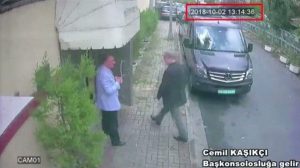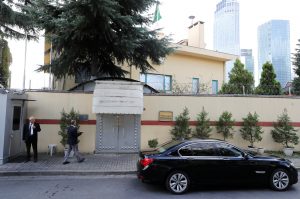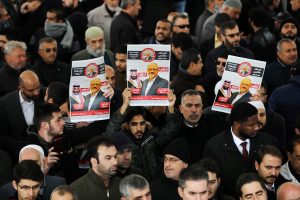
By Orhan Coskun, Sarah Dadouch and Stephen Kalin
ISTANBUL (Reuters) – Jamal Khashoggi believed he was safe in Turkey.
Khashoggi, a veteran Saudi journalist and newspaper editor, had lived in exile in Washington for more than a year, writing a column for the Washington Post in which he regularly criticized his country’s crackdown on dissent, its war in Yemen and sanctions imposed on Qatar.

A still image taken from CCTV video and obtained by TRT World claims to show Saudi journalist Jamal Khashoggi as he arrives at Saudi Arabia’s consulate in Istanbul, Turkey Oct. 2, 2018. Reuters TV/via REUTERS
He said he could write freely in the United States in a way that was impossible at home, according to friends and colleagues, but he was increasingly worried that Riyadh could hurt him or his family.
In Turkey, though, Khashoggi had friends in high places, including some of President Tayyip Erdogan’s advisers. So when he walked into the Saudi consulate in Istanbul at 1 p.m. on Tuesday, Oct. 2, he hoped the appointment would be brief, a simple bureaucratic task that would allow him to marry his Turkish fiancee, whom he had met four months earlier.
“He said the safest country in the world for Saudi Arabians was Turkey,” said Yasin Aktay, an Erdogan aide and close friend of Khashoggi.
Friends and family have not seen him since.
Turkish officials have said they believe Khashoggi, 59, was killed inside the consulate.
Saudi Arabia has strongly rejected the accusation. The kingdom’s ambassador to the United States, Prince Khalid bin Salman, said reports suggesting Khashoggi went missing in the Istanbul consulate or that Saudi Arabia had killed him “are absolutely false and baseless” and a product of “malicious leaks and grim rumors.”
“Jamal is a Saudi citizen who went missing after leaving the Consulate,” the ambassador said in a statement. Saudi Arabia has sent a team of investigators to work with Turkish authorities and “chase every lead to uncover the truth behind his disappearance.”
In interviews, Turkish officials provided new details of their investigation into the missing journalist.
Two senior Turkish officials revealed the existence of an object that may provide important clues to Khashoggi’s fate: the black Apple watch he was wearing when he entered the consulate. The watch was connected to a mobile phone he left outside, they said.

An official walks to gate of Saudi Arabia’s consulate in Istanbul, Turkey, October 10, 2018. REUTERS/Osman Orsal
Investigators are also focusing on 15 Saudi men who entered the consulate around the same time as Khashoggi and left a short time later. These men had arrived hours earlier from Riyadh, most of them by private plane, the officials said. By the end of the day, they were on their way back to the kingdom.
Turkish newspaper Sabah said on Wednesday it had identified the 15 as members of a Saudi intelligence team. They included a forensic expert. A Turkish official did not dispute the report.
And investigators are trying to trace a vehicle that left the Saudi consulate at the same time as two cars destined for the airport, one of the officials said. This vehicle didn’t turn toward the airport, but set off in the opposite direction.
This story is based on interviews with Turkish officials, Khashoggi’s fiancee and more than a dozen of his friends, who gave insight into the columnist’s state of mind in the days leading up to his disappearance, and explained why he went to the Saudi consulate in Istanbul, not the embassy in his adopted home of Washington.
The case threatens to drive wedges between Saudi Arabia and Turkey and between Riyadh and its western allies. U.S. President Donald Trump said on Oct. 9 he plans to speak with Saudi Arabian officials about Khashoggi’s disappearance. The mystery also threatens to undermine Crown Prince Mohammed bin Salman’s drive to attract foreign investors and new high-tech business to a country that is too dependent on oil revenues.
A NEW LIFE
Khashoggi met his Turkish fiancee, Hatice Cengiz, who is 23 years his junior, in May at a conference in Istanbul, according to Cengiz and a close friend of the Saudi journalist.
Their relationship quickly evolved, and Khashoggi spoke about wanting to start a new life with her. By August, the couple had decided to marry in Turkey, where Cengiz lived, and spend much of their time there.
“Jamal bought an apartment in Istanbul and we were furnishing our new home,” Cengiz told Reuters on Oct. 9. “We were planning to marry this week before Jamal flew back to Washington.”
The decision to marry in Istanbul, whose mosques reminded Khashoggi of his hometown Medina, set off a paper chase that ultimately ended in Khashoggi’s disappearance.
Turkish law required that Khashoggi, who was divorced, provide proof that he did not have a wife. He asked if he could get the document from the Saudi embassy in Washington, according to a friend in Europe, but was told the consulate in Turkey was better placed to help.
Cengiz said Khashoggi wouldn’t have applied for the document in Istanbul if he could have avoided it. Asked to comment, a Saudi official said it was “not accurate” that Khashoggi was told to go to Istanbul.
The friend recounted how he warned Khashoggi against getting the paper in Istanbul for fear the Saudis might arrest him if he set foot in the consulate. “He told me there is no solution except to arrange for this paper with the consulate in Turkey,” said the friend, who was in frequent contact with Khashoggi in the days before he disappeared. Khashoggi reassured him, he said, that his good connections in Turkey meant “no one can do anything to harm me in Istanbul.”
Khashoggi visited the consulate without an appointment on Friday, Sept 28. Cengiz waited outside. That first meeting went smoothly. Khashoggi told Cengiz and several friends that officials in the consulate had treated him politely. They explained the paperwork would take time to prepare.
Khashoggi exchanged phone numbers with a consulate official named Sultan so he could call and check on progress, according to three friends. Sultan said the document would be ready early the following week. Reuters has not been able to locate Sultan or confirm his role at the consulate. The consul declined to comment on who Khashoggi spoke to.
“He came out smiling. He told me ‘inshallah (God willing) I will receive this paper after I come back from London,'” Cengiz said.
Confident he would soon have the paperwork he needed, Khashoggi flew to London later the same day to attend a conference. He was asked there by colleagues about the threat he faced from the Saudi authorities for his work, according to some of those present.
“One of my colleagues at dinner asked if he saw a possibility that his citizenship would be withdrawn,” said Daud Abdullah, director of Middle East Monitor which organized the conference. “He discounted that – he didn’t think the authorities would go that far.”
An exiled Saudi dissident who spoke to Khashoggi in the days before his disappearance said his friend was worried that he might face interrogation by the Saudis, but nothing more.
Another friend, British-Palestinian activist Azzam Tamimi, who saw Khashoggi during that trip to London, said he “didn’t seem scared at all. The opposite. He was relaxed and calm.” Tamimi saw Khashoggi off at the airport in London.
MYSTERY MEN
Khashoggi flew back to Istanbul from London on Monday evening, Oct 1. The following morning, he spoke again with consul worker Sultan, who told him to collect the document at 1 p.m the same day.
Outside the consulate, a low rise building at the edge of one of Istanbul’s business districts, Khashoggi handed Cengiz his two mobile phones, the fiancee told Reuters. He left instructions that she should call Aktay, the Erdogan aide, if he didn’t reappear. Khashoggi was wearing his black Apple Watch, connected to one of the phones, when he entered the building.
A senior Turkish government official and a senior security official said the two inter-connected devices are at the heart of the investigation into Khashoggi’s disappearance.
“We have determined that it was on him when he walked into the consulate,” the security official said. Investigators are trying to determine what information the watch transmitted. “Intelligence services, the prosecutor’s office and a technology team are working on this. Turkey does not have the watch so we are trying to do it through connected devices,” he said.
Tech experts say an Apple Watch can provide data such as location and heart rate. But what investigators can find out depends on the model of watch, whether it was connected to the internet, and whether it is near enough an iPhone to synchronize.
When Khashoggi did not emerge quickly, Cengiz said she at first hoped he had got the document and was talking with consul staff. “But when time passed and employees started leaving the building and he still wasn’t out, I panicked,” she said.
She called Aktay, the Erdogan aide, around 4.30 p.m and told him her fiance was missing. As soon as he received the call, Aktay told Reuters, he contacted Turkish security forces and intelligence officials. “Of course I also called the office of the president, who was in a senior party committee meeting at that point,” Aktay said. “After about half an hour, everybody was informed and ready to take the measures needed in this case. And of course then, a long period of tension and expectation started.”
Local and international media reported Khashoggi’s disappearance the next day, Wednesday, Oct. 3. Turkish authorities said there was no evidence to suggest Khashoggi had left the building, and they believed he was still inside. Saudi authorities countered that their citizen had left the consulate and that they were investigating.
Two Turkish security sources told Reuters that security camera recordings showed Khashoggi had not left the consulate by either of its two exits.
They said that 15 Saudi men had entered the building at around the time Khashoggi went in, having flown into Istanbul earlier in the day, most of them on a private aircraft from Riyadh and some on commercial flights.
The men left after “some time” in two cars and returned to the airport, the sources said. They said a third vehicle left at the same time but turned in the opposite direction. Investigators are trying to trace its route by analyzing surveillance cameras. The Istanbul consulate referred questions about the 15 men and the vehicles to Saudi authorities, who did not respond to a request for comment.
“It is a very mysterious situation. Diplomats that came in private jets, stay in Turkey for a few hours, and leave. It is also very easy for them to pass through security due to their diplomatic immunity,” one of the security sources said.
According to Flight Tracker, an online flight tracking system, a private plane that brought nine of the men in the early hours of Oct. 2 was registered to a company called Sky Prime Aviation Services. A company official confirmed that Sky Prime Aviation owned the plane and that it was in use on Oct. 2, but gave no further details. He said the firm was owned by a private company registered in Saudi Arabia. Two industry sources said the firm belongs to the Saudi government. The Saudi government did not respond to a request for comment.
The other six men arrived on commercial flights, the security source said. The 15 men checked in, briefly, to two hotels, the Movenpick and Wyndham, which are close to the Saudi consulate. The hotels declined to comment.
As pressure built on Saudi Arabia to locate their missing citizen, Saudi officials in Istanbul showed a Reuters reporter around the consulate on Saturday, Oct. 6, opening cupboards and inviting him to inspect the ladies’ bathroom. A few hours later, Turkish authorities said they believed Khashoggi had been killed.
A Saudi source told Reuters that British intelligence believed there had been an attempt to drug Khashoggi inside the consulate that culminated in an overdose. He said the information came from a British intelligence source. Contacted by Reuters, British intelligence did not comment. Asked about this account, a Saudi official said: “This death is not true.”
REFORM NOT REVOLUTION
Khashoggi’s message in his columns for the Washington Post was one of reform, not revolution.
He often championed political change but did not question the Saudi monarchy as an institution. He criticized the royal family for misusing Saudi’s oil wealth and questioned specific policies, such as the war in Yemen and the arrests of Saudi intellectuals and activists.
His bumpy relations with the Saudi authorities and the clerical establishment predated the rise of Crown Prince Mohammad bin Salman. In 2003 he was fired as editor-in-chief of reform newspaper Al Watan, less than two months into his tenure, after publishing columns critical of the growing influence of the religious establishment in Saudi Arabia.
In 2007, he was named editor-in-chief of Al Watan for a second time but was forced to resign three years later after publishing an article that challenged some elements of Salafism, a branch of Sunni Islam.
Khashoggi was also the consummate insider, as an adviser to former intelligence chief Prince Turki al-Faisal and a confidant of billionaire investor Prince Alwaleed bin Talal.
Yet by early 2017, he was feeling the heat again. The authorities ordered him to stop writing and tweeting, then he watched as other writers, including several friends, were detained in a crackdown on dissent in September, 2017. “He was outside (the country), so he didn’t return,” said his friend, Tamimi.
In the United States, he felt he could speak freely. Karen Attiah, his editor at the Washington Post, said it was as if he had rediscovered journalism. “When he was in the newsroom, when I brought him the first time, he became energized. He took a selfie and said, ‘I miss this. I miss being in a newsroom.’ We spoke about editing and what it was like to talk to writers. He just lit up,” she said.
An acquaintance said Khashoggi was considering launching new projects from Washington. One idea focused on bringing attention to political prisoners in Saudi Arabia and promoting democracy in the Arab world, said the acquaintance.
Attiah, the global opinions editor of the Washington Post, said Khashoggi rarely expressed fears for himself but he was “really torn up” about the pressures on his family. “I did worry about Jamal,” she said. “I just thought, ‘Who would be so brazen to go after him?'”
(Additional reporting by Yara Bayoumy and Jonathan Landay in Washington; Editing by Janet McBride and Nick Tattersall)










